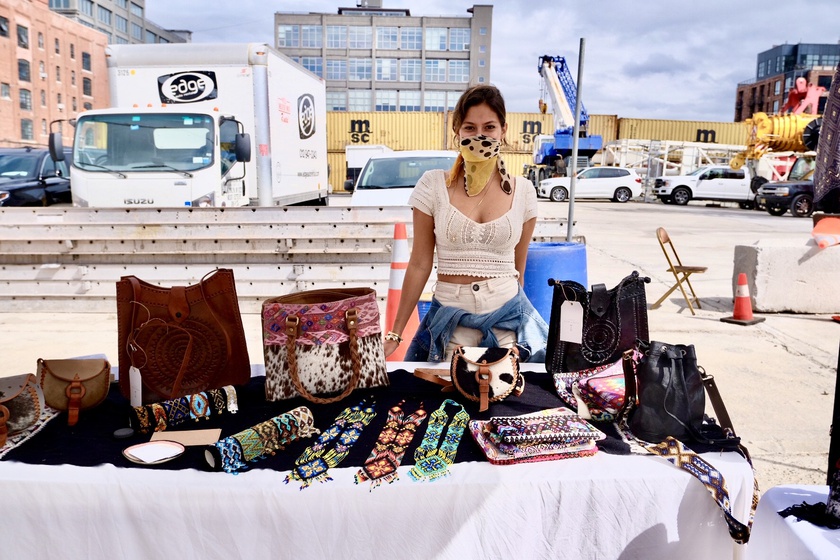{shortcode-c2b40d3a543b75030304bbb7504fcf02bece9684}
Brooklyn-dwellers look cheerier than you might expect nine months into a global pandemic: A couple walks, hand in hand, carrying their baby in one free arm and grasping their dog’s leash in the other; a woman in a pink corduroy jumpsuit rides her ’50s-style bike in the street; a pair of friends gush over hand-made ceramic mugs in the doorway of an artisan shop. I’m astonished at the way positivity seems to be rolling off of these New Yorkers in waves. But then, I remember, it is a Saturday.
Every weekend since Aug. 9 of this year, local vendors have flocked to Greenpoint, Brooklyn to set up shop under canvas tents (all stationed six feet apart from each other, of course). The Greenpoint Terminal Market is organized by Lauren Nishi, who wanted to facilitate local commerce on summer weekends in hopes of easing the financial hardships that small businesses continue to face amid the COVID-19 pandemic.
With festivals cancelled until further notice, the DJ bumping “Get it Together” by Drake in the lot adjacent to this outdoor market is about as close as any of us are going to get to that “just dartied” feeling for a long time. But that doesn’t seem to cheapen anyone’s fun on this Saturday afternoon. Market-goers are beaming, strutting around in their newly purchased vintage jackets, squeezing lime into their al pastor tacos, and sniffing their hand-poured soy candles. For public health reasons, all smiles are hidden under masks and polypropylene filters.
Besides vintage and artisan-made goods, a large number of vendors are selling protective facemasks. Christian Rivera, the founder of Color, Prints, and Stripes Studio, is one of them, hawking masks that he has designed and cut by hand. He refers to this work as his “happy time within this crazy time,” explaining how the unfortunate circumstances have allowed him to work on this “passion project.” With each mask sold, he hopes to transform his joy into a public service by donating masks to New York City Public Schools. “You’ve got to create some happiness,” Rivera says. “And if you can spread that with people, why not?”
Rivera isn’t the only vendor using his passion to spread joy. Practically every single vendor present wants to share their enthusiasm for their craft with others. Mexican designer Renata Solis glows as she tells me about her brand Zulia & Huipa: “It all started a year ago because I am so in love with my roots and I wanted to bring them here.”
Solis collaborates with indigenous women in Mexico and Guatemala to create one-of-a-kind cowhide leather bags. She mixes the traditional Mayan textiles with leather, a by-product of the subsistence farms these communities run. The production of these bags, she explains, follows a custom of her heritage to use the entire animal, leaving no part unused or wasted. The same waste-nothing philosophy is used while crafting the other parts of the bags as well: Its cotton fibers are hand-harvested, hand-dyed, and hand-embroidered with natural fruit and vegetable pigments. Afterwards, the materials are fashioned, by hand, into Solis’ designs.
{shortcode-d5a782c9de57486f4d32a4b62b093b4a6d1209b4}
Solis believes that the sustainable nature by which her luxury bags are made is just as important to the customer as the beauty of the final product. “People want to know who is behind the brand,” she says, and explains how markets like this one have helped her gain visibility and connect with customers in a more authentic way than is possible through online shopping.
Daye N. Knight, the founder of Daye Night Candles, agrees. Greenpoint Terminal Market allows her to connect with customers in person and gain visibility as a small business. She believes that “as a customer, you can feel the happiness when you buy from someone [who handcrafts their merchandise],” especially during times of economic hardship.
“Your $50 means more to me than it does to Bath and Body Works,” she says with a laugh.
Knight, who started her candle business in February of this year, used her time in quarantine to perfect her craft in order to provide her customers with high quality candles that could stand up to the offerings of her corporate competitors.
“I started because I needed candles, but Bath and Body Works wasn’t having a sale, so, I was just like, ‘let me go ahead and just make some.’” Although online sales have been relatively slow, Knight is hoping that customers who have purchased from her in person will continue to come back for more. She hands out postcards with discount codes, hoping the in-person conversations she has had with customers will help boost her online sales.
Many vendors expressed uncertainty about where they might be able to sell in-person next. As fall turns into winter, Knight described the possibility of buying blankets and heaters for other outdoor markets — that is, if there are any in the colder months.
— Staff writer Nicole B. Farina can be reached at nicole.farina@thecrimson.com. Follow her on Twitter @nicolefarinaa.


